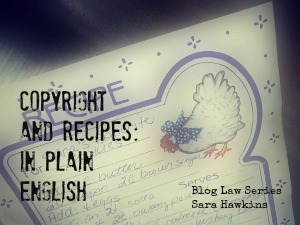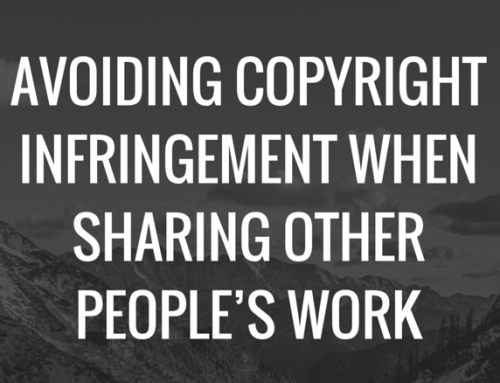Recipe Copyright Explained in Plain English
One of the most asked questions I get has to do with recipe copyright. It’s very upsetting for food bloggers to see their work copied verbatim. Unfortunately, unlike photos or images, all words don’t carry the same weight when it comes to copyright. Recipes are one of those areas where copyright law has a number of limitations and does not always cover a blogger’s hard work.
Certainly, there may be ethical issues issue when a recipe is copied and not given attribution. And plagiarism is often brought up when people see their recipe used without credit. But plagiarism is not illegal and not part of copyright law.
How do I protect my recipe from being copied?
Creating a meal is one thing. Write it down step by step, ingredient by ingredient is painstaking, tedious and not to mention time-consuming. So it’s no wonder that very few recipes are truly original. Most recipes have been adapted from family favorites, modified because you want to simplify the ingredients or method or re-created from a handful of similar recipe that you’ve taken the best from each.
Once the recipe is perfected, tested, and photographed nine-hundred and thirty-two times, you blog about it and post pictures and further bask in what surely will be loving and wonderful comments of your faithful readers. Then you hit publish and wait for the Google Alert to warn you that someone has just done their finest cut and paste job and posted your recipe on their blog. And because they are so genuinely nice they even gave you a ‘shout out’, which is how you know you’ve been loved on so nicely. Now what? (besides wanting to beat them with a wet homemade noodle)
Plagiarism? Copyright violation? Rogue food blogger? Whatever it is, you’re having none of it!
Plagiarism is not illegal. Unethical, sure. Preventable by law, no. Plagiarism is the unauthorized use of another’s work represented as your own. Being that there are no legal constructs for it with regard to your recipe you’re better off focusing your efforts on other theories. Your post, to some degree, is protected by copyright but the recipe itself may not be. And if they gave you a ‘shout out’ or somehow attributed that recipe to you then they’re not claiming it as their own and plagiarism will not apply.
Copyright sounds like it should apply. And it may, if the ingredient list AND its instructions are lifted verbatim or “substantially”. In general, US Copyright applies to original works of authorship fixed in a tangible medium. “Original” means that an author produced a work by his or her own intellectual effort instead of copying or modifying it from an existing work. “Fixed in a tangible medium” means that the work is able to be perceived, reproduced, or otherwise communicated. Your blog is the necessary ‘tangible medium’.
It goes without saying that a cookbook, like most other books, is an original work of authorship. It’s not the recipes, individually, that are protected. Although, if sufficiently original, the individual recipe may be protected. Instead, it is the book as a whole – not unlike anything on the NYT Bestseller list – that is protected. Each recipe, on its own, doesn’t hold much weight in the world of copyright. As you can well imagine, there are probably billions of recipes out there. And most could likely be traced back to some other recipe for its inspiration. Copyright will only protect the written work and would never prohibit someone from reading the recipe and making it.
So what do you do? If your recipe is up on someone else’s blog without any link to you or even the slightest passing reference, then there is at minimum a possibility to claim your work as being plagiarized. Depending on other factors, verbatim copying my give you other digital rights.
But what if it’s not verbatim? How much of it do they have to take? Is it truly an “original work of authorship” giving rise to copyright? What if you adapted a recipe (a derivative work, perhaps)? And then, what do you do?
You always have the ability to send a nice email thanking them for liking your recipe and asking for it to be removed or changed or asking for a link back or credit of some form. But what more can you do?
The best way to protect your recipe from being copied is not to share it. Seems counterintuitive, yes? But think of all those corporate recipes that are secrets such as Coke (although it appears even this may no longer be secret), Cinnabon, and Cheetos.
But the reality for many food bloggers is that your blog exists so you can share your recipes. Without the sharing you’d have no blog. It’s your passion. Not just the food but also the sharing.
What part of recipe is copyrightable?
Lists are not subject to copyright, per US Copyright Law. This is well-known to mean the ingredient listing is not protected. With recipes, it’s the instructions or directions that are potentially copyrightable so long as they meet the criteria of being an original work of authorship and substantial literary expression. So that recipe for your fabulous margarita probably doesn’t count as ‘substantial literary expression’ when the directions are something like put all ingredients in blender, blend on high for 3 minutes, pour into glass and enjoy. What you need is something more, well, substantial.
Why are recipes so unique?
Recipes are meant to be shared. It’s a long-standing tradition to pass along the recipe for a favorite dish. You’re flattered when someone wants your recipe. But when it impacts your profitability and your brand, it’s a completely different proposition. The line between acceptable copying and damage to your brand, though, is as thin as a cucumber slice on your mandolin.
Attribution
Where did the recipe come from? Was this something you learned to make with your nana? Or did you happen to see it on Epicurious or Food Network? Maybe you read it in a magazine and you’re tweaking it because your family doesn’t like one of the ingredients (again, possibly a derivative work)?
As with anything we permissively take from another source, it should be accompanied by some form of attribution. Minimally, a mention. Preferably a link, even if it’s just to the home page.
What to do if your recipe is on another site without permission?
As with most other situations of blog copying, you have a few options. If you don’t feel the copying was in bad faith or is not an ongoing problem with the same person, the first step should be to reach out to the offender and ask for compliance. But first you have to make certain that it is YOUR recipe and not one that is just similar. AND you need to be sure that you didn’t ‘adapt’ it from another source that would prevent you from claiming copyright. If it is indeed your recipe you can take the same steps with regard to your recipe as to your other digital rights. But even though you do have a host of digital rights, understand that the legal support related to individual recipes is often very flimsy, unless the copyright has been registered with the US Copyright Office.
How do I attribute a recipe that I found somewhere else?
Unless you completely change the ingredient list so that it hardly resembles the original, then you’ve likely adapted it so treat it as such. And since you’ve re-writren the directions portion, because you’ve read this and know that the cut/paste function isn’t the way to go, you should indicate from where you adapted the recipe. For example: adapted from Other Website and link to the original recipe; if it’s from a written publication you should indicate that it was adapted from the recipe for Super Tasty Food in Magazine I Read It In. Unless you completely change the ingredient list so that it hardly resembles the original, then you’ve likely adapted it so treat it as such.
I didn’t adapt the recipe but was inspired to create my own version, what do I do?
Again, the best thing to do is tell your readers what gave you the inspiration to come up with the recipe. Whether it was a dish at a restaurant, reading a recipe in a magazine that evoked memories of childhood or watching a tutorial online, giving some background is helpful in explaining why the recipe may be similar to something else. Also, it allows you to add a level of originality to your post and makes it less enticing to copy.
Conclusion
Copyright as it applies to recipes only relates to the instructions, not the ingredient list. But that doesn’t mean anyone is free to copy a recipe and tweak the instructions slightly and call it new or original. And if someone does copy your recipe verbatim or didn’t rewrite the directions sufficiently, take the necessary steps to protect yourself. Knowing your digital rights, even as it applies to recipes is important.
Note: I mention ‘derivative work’ twice. That is a complex area of copyright law about being able to make additional new works from an original (like making a movie from a book). If this is of concern for you, please seek the appropriate legal assistance.






Sara–thank you so much for addressing this issue with the support of the actual law, instead of perpetuating the myths that are so prevalent in the blogosphere and messageboards. So much of what people think they know about copyright is grossly inaccurate, based on their “feeling of ownership” rather than an actual review of the law.
Aside from recipes, another area that I see constant misinformation regarding copyright and other “ownership” protections is the realm of patterns (both sewing patterns as well as knitting/crochet patterns…and even tutorials that do not include a “pattern” per se). The specific misinformation in these cases has to do with whether copyright protections extends to finished items (and is complicated by issues of what exactly “licensing” licenses one to do)…unfortunately, the industry itself is responsible for creating and perpetuating this one. Look at any magazine or sewing pattern, and you will find language stating that items may only be made for personal use and not sold. As a result, the idea that finished objects are covered by copyright (and that licensing gives permission to sell finished objects rather than being a trademark use issue) pervades the WAHM-pattern world. This has lead to the “blacklisting” of many a WAHM who has been “caught stealing” by selling from another WAHM’s pattern “without licensing” and is then called out via a blog or messageboard post.
I hope that you will cover pattern/instruction issues as well…confusion regarding copyright/patent/trademark runs rampant! I would be very interested to read your insights regarding this area!
maybe this was as a result of my request? good post – i learned some things and i bet others have too. just last night, i linked to a website with a great recipe and posted it via copy and paste – at least i gave the link, right? 😉
Wonderful article, Sara. I hate that I wasn’t able to be at Blissdom this year, especially for your session! I know it was awesome!
Hi Sara,
This was an excellent article. I am so glad you are writing this series.
Blessings
Honey
[…] Know Your Digital Rights – Recipe Copyright: (Saving for Someday) […]
[…] If you are a food blogger, or if you post recipes, you should read Sara’s article on Recipe Copyright. […]
Hi! Thank you for writing this! It clears up some questions I had about my food blog. I do have a question about the ingredient list for one of my recipes. Is it legal to post a particular brand that I use in my recipes? For example, I used Gardein Beefless Crumbles in my spaghetti sauce. Am I allowed to list the brand in my ingredient list for the recipe? Thank you!
Hello Jessica,
You’re actually bringing up a trademark question, which shows you how intertwined copyright and trademark can be.
Under Trademark law there is concept called nominative fair use which allows you to use a trademark when you’re using it to describe the product or service specifically. I recently wrote about trademark basics, if you need additional information – http://sarafhawkins.com/trademark-laws-faq/
Hope this helps,
Sara
[…] Sara Hawkins- Recipe Copyright […]
Thanks so much! This article about recipe copyright has been very helpful to me! 🙂
Hi Sara,
I happen to come across your website.I am a new food blogger and do not know much about it.The post was informative.Though right now I am concentrating more on my content .